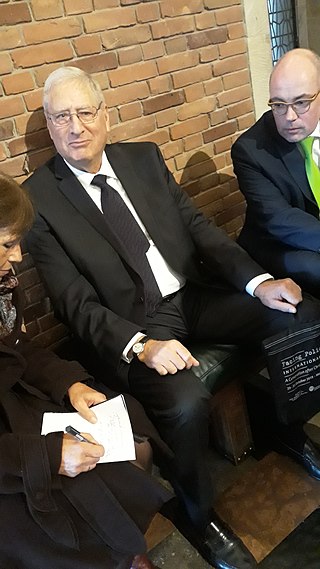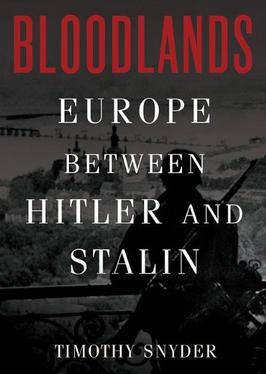
Jews for the Preservation of Firearms Ownership (JPFO) is a 501(c)(3) nonprofit organization dedicated to the preservation of gun rights in the United States and to encourage Americans to understand, uphold, and defend "all of the Bill of Rights for all Citizens." The group was founded by U.S. Navy veteran, former FFL dealer, and author Aaron S. Zelman in 1989. Jews for the Preservation of Firearms Ownership recognizes the Second Amendment as protecting a pre-existing natural law right of individuals to keep and bear arms. It is based in Bellevue, Washington.

Gun politics in the United States is characterized by two primary opposing ideologies regarding private firearm ownership.
The small arms trade is the markets of both authorized and illicit small arms and light weapons (SALW), as well as their parts, accessories, and ammunition.

Edwin Black is an American historian and author, as well as a syndicated columnist, investigative journalist, and weekly talk show host on The Edwin Black Show. He specializes in human rights, the historical interplay between economics and politics in the Middle East, petroleum policy, academic fraud, corporate criminality and abuse, and the financial underpinnings of Nazi Germany.

Christopher Robert Browning is an American historian and is Professor Emeritus of History at the University of North Carolina at Chapel Hill (UNC). A specialist on the Holocaust, Browning is known for his work documenting the Final Solution, the behavior of those implementing Nazi policies, and the use of survivor testimony. He is the author of nine books, including Ordinary Men (1992) and The Origins of the Final Solution (2004).
The Independent Institute is an American libertarian think tank founded in 1986 by David J. Theroux and based in Oakland, California. The institute has more than 140 research fellows and is organized into seven centers addressing a range of political, social, economic, legal, environmental, and foreign policy issues. The Independent Institute publishes books, reports, blogs, podcasts, and the quarterly scholarly journal The Independent Review.

Nazi analogies or Nazi comparisons are any comparisons or parallels which are related to Nazism or Nazi Germany, which often reference Adolf Hitler, Joseph Goebbels, the SS, or the Holocaust. Despite criticism, such comparisons have been employed for a wide variety of reasons since Hitler's rise to power. Some Nazi comparisons are logical fallacies, such as reductio ad Hitlerum. Godwin's law asserts that a Nazi analogy is increasingly likely the longer an internet discussion continues; Mike Godwin also stated that not all Nazi comparisons are invalid.
Jeffrey C. Herf is an American historian of modern Europe, particularly modern Germany. He is Distinguished University Professor, of modern European history, Emeritus at the University of Maryland, College Park.
In Germany, access to guns is controlled by the German Weapons Act, which adheres to the European Firearms Directive and was first enacted in 1972, and superseded by the law of 2003. This federal statute regulates the handling of firearms and ammunition as well as acquisition, storage, commerce and maintenance of firearms.
Gavriel David Rosenfeld is President of the Center for Jewish History in New York City and Professor of History at Fairfield University. His areas of academic specialization include the history of Nazi Germany, memory studies, and counterfactual history. He is an editor of The Journal of Holocaust Research and edits the blog, The Counterfactual History Review, which features news, analysis, and commentary from the world of counterfactual and alternate history.
Several individuals and groups have drawn direct comparisons between animal cruelty and the Holocaust. The analogies began soon after the end of World War II, when literary figures, many of them Holocaust survivors, Jewish or both, began to draw parallels between the treatment of animals by humans and the treatments of prisoners in Nazi death camps. The Letter Writer, a 1968 short story by Isaac Bashevis Singer, is a literary work often cited as the seminal use of the analogy. The comparison has been criticized by organizations that campaign against antisemitism, including the Anti-Defamation League (ADL) and the United States Holocaust Memorial Museum, particularly since 2006, when PETA began to make heavy use of the analogy as part of campaigns for improved animal welfare.

The Nazi gun control argument is the claim that gun regulations in Nazi Germany helped facilitate the rise of the Nazis and the Holocaust. Historians and fact-checkers have characterized the argument as dubious or false, and point out that Jews were under 1% of the population and that it would be unrealistic for such a small population to defend themselves even if they were armed.
The Other Side: the Secret Relationship Between Nazism and Zionism is a book by Mahmoud Abbas, published in 1984 in Arabic. It was re-published in 2011. It is based on his CandSc thesis, completed in 1982 at Patrice Lumumba University under the title The Connection between the Nazis and the Leaders of the Zionist Movement, and defended at the Institute of Oriental Studies of the Soviet Academy of Sciences. The central thesis of the book is that the Zionist movement and its leaders were "fundamental partners" of the Nazis and equally responsible for the Holocaust.

The Transfer Agreement: The Dramatic Story of the Pact Between the Third Reich and Jewish Palestine is a book written by author Edwin Black, documenting the transfer agreement between Zionist organizations and Nazi Germany to transfer a number of Jews and their assets to Palestine.

Bloodlands: Europe Between Hitler and Stalin is a 2010 book by Yale historian Timothy Snyder. It is about mass murders committed before and during World War II in territories controlled by Nazi Germany and the Soviet Union.

The Holocaust in France was the persecution, deportation, and annihilation of Jews between 1940 and 1944 in occupied France, metropolitan Vichy France, and in Vichy-controlled French North Africa, during World War II. The persecution began in 1940, and culminated in deportations of Jews from France to Nazi concentration camps in Nazi Germany and Nazi-occupied Poland. The deportation started in 1942 and lasted until July 1944. Of the 340,000 Jews living in metropolitan/continental France in 1940, more than 75,000 were deported to death camps, where about 72,500 were murdered.

Stephen P. Halbrook is a senior fellow at the Independent Institute and an author and lawyer known for his litigation on cases involving laws pertaining to firearms. He has written extensively about the original meanings of the Second Amendment and the Fourteenth Amendment. He has argued and won three cases before the US Supreme Court: Printz v. United States, United States v. Thompson-Center Arms Company, and Castillo v. United States. He has also written briefs in many other cases, including the Supreme Court cases Small v. United States and McDonald v. Chicago. In District of Columbia v. Heller, he wrote a brief on behalf of the majority of both houses of Congress. He has written many books and articles on the topic of gun control, some of which have been cited in Supreme Court opinions. He has testified before congress on multiple occasions. Halbrook's most popular book is That Every Man Be Armed, originally published in 1984. The book is an analysis of the legal history and original intent of the Second Amendment.
The disarmament of the German Jews started in 1933, initially limited to local areas. A major target was Berlin, where large-scale raids in search for weaponry took place. Starting in 1936, the Gestapo prohibited German police officers from giving firearms licenses to Jews. In November 1938, the Verordnung gegen den Waffenbesitz der Juden prohibited the possession of firearms and bladed weapons by Jews.

Wendy Lower is an American historian and a widely published author on the Holocaust and World War II. Since 2012, she holds the John K. Roth Chair at Claremont McKenna College in Claremont, California, and in 2014 was named the director of the Mgrublian Center for Human Rights at Claremont. As of 2016, she serves as the interim director of the Jack, Joseph and Morton Mandel Center for Advanced Holocaust Studies at the United States Holocaust Memorial Museum in Washington, DC.

Comparisons between Israel and Nazi Germany occur frequently in the political discourse of anti-Zionism. Given the legacy of the Holocaust, the legitimacy of and intent behind these accusations are a matter of debate, particularly with regard to their potential nature as a manifestation of antisemitism. Historically, figures like British historian Arnold J. Toynbee have drawn parallels or alleged a relationship between Zionism and Nazism; British professor David Feldman suggests that these comparisons are often rhetorical tools without specific antisemitic intent. French philosopher Bernard-Henri Lévy argues that such comparisons not only lack historical and moral equivalence, but also risk inciting anti-Jewish sentiment.












